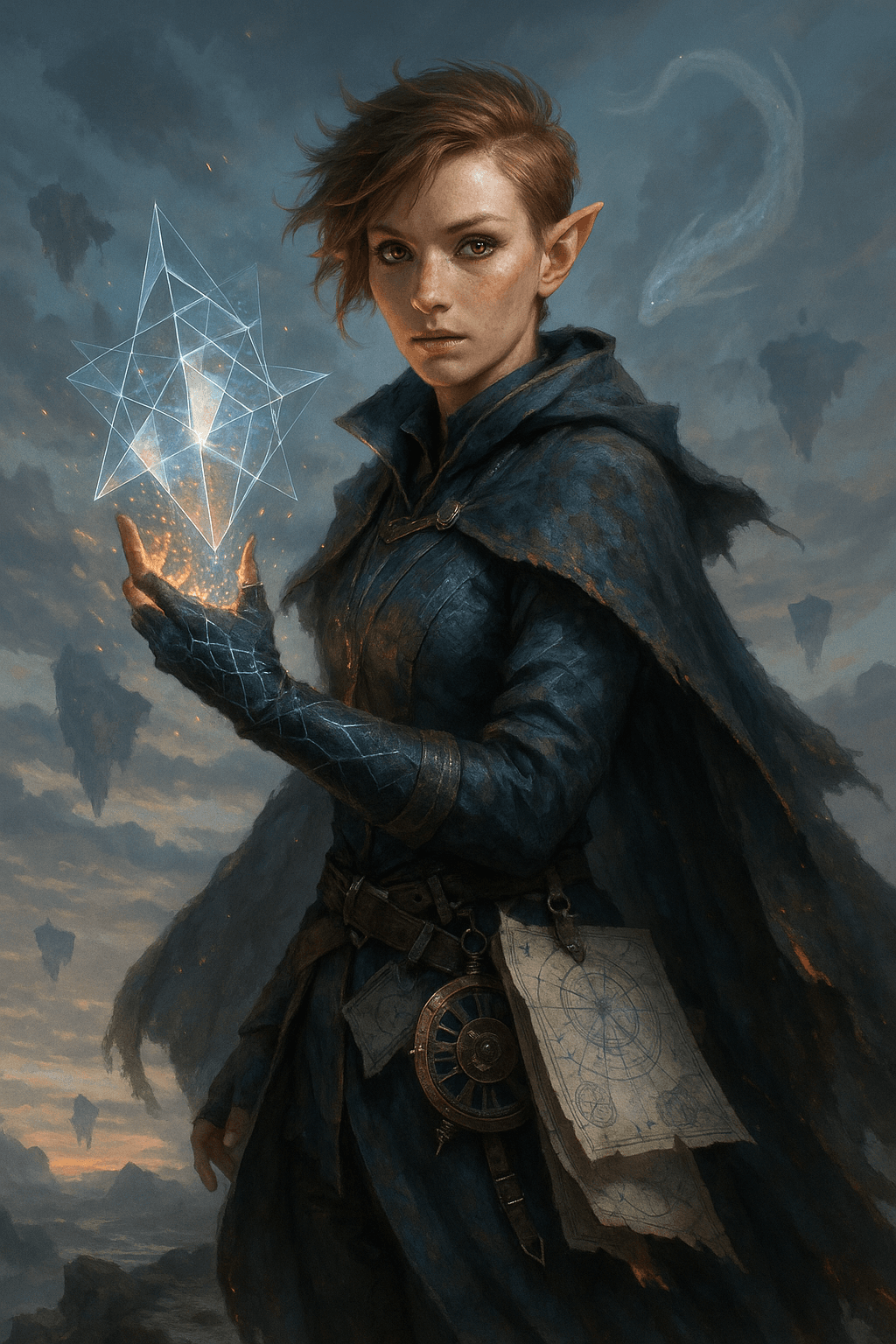Irielle Stormflame
If reality cracks, learn its music.

There were scholars who traced the heavens with ink and patience, and there was Irielle Stormflame—who traced them with fire. Even as a young light-elf apprentice she moved like a struck match through the galleries of the Aether Crown, leaving behind the warm smell of ozone and the faint tremor of clashing theories. She did not seek danger for spectacle; she sought the boundary where knowledge refused to be polite.
Ascendance.
In the high glow of Skyreach’s rise, when crystal isles first learned to hold themselves against the wind, Irielle attached herself to the laboratories that studied failure. Velian Thalos—then still more comet than caution—opened a door for her and said, “Show me a proof that breathes.” She did. Her early papers were annotated with scorch marks and elegant math, demonstrations that Aether could be coaxed into temporary forms—ladders of light, self-correcting bridges, even a ‘listening prism’ that turned Star-Serpent whispers into diagrams across a sheet of beating air. She tested her hypotheses outside, where the sky could disagree safely, and returned with hair full of sparks and numbers the elders had not considered. When someone asked why she refused to specialize, she replied, “Because the cosmos doesn’t. It sings harmony.”
She was reckless, yes—reckless in the way of a climber who trusts their fingers because they have spent years building them. The other apprentices called her storm-blessed; Velian called her necessary. When the Celestial Veil was cast to hide the most volatile isle, she argued that concealment was a kind of laziness. “A covered wound still festers,” she told the council. She lost the vote, then snuck instruments past the wards to continue listening. The data she smuggled back would matter later.
Fracture.
Everything good broke loudly. The Shattering tore proofs, inverted clocks, and made the air itself a poor witness. Irielle did not flinch; she pivoted. If stability would not hold, she would research instability as if it were a material in its own right. Her ‘half-born equation’—a field ritual that braided time-tremors into a usable rope—saved a falling observatory for twenty-one minutes, long enough to evacuate its wing of sleeping students. Afterward the old safety masters tried to forbid the technique; Irielle wrote their edict into the margin of her next paper and demonstrated a safer variant the following week.
Velian, hardening into desperation, wanted an answer that restored supremacy. Irielle wanted one that restored breath. She argued for adaptive architectures, for ‘living math’ that flexed under stress, for accepting that light now behaved like a river and not a crystal. When she refused to surrender her Rift-work, he called it heresy. The Rift-Splinter coalesced around her—not a cult, but a workshop of the bruised and bright. She did not promise them victory; she promised them method. “We will learn the dialect of a cracked world,” she said, and they did, building tools that kept bridges up and people whole even while the isles bled height into the horizon.
Twilight.
Survival shrank everyone’s nouns. While Itharûn and Thar Zûl fought their Last Sky War far away, Skyreach argued through thin walls. A Starseer rose to hold the tatters together and, to their credit, invited Irielle to speak rather than merely be contained. She stood beneath the dimming Crown and presented a plan so audacious the chamber forgot to breathe: a new floating isle, not ripped from mountain or memory but woven from stabilized Rift-flows, anchored by song-seals and tuned by Star-Serpent cadence. It would not be large, she admitted. It would be honest.
The preservationists said the risk would kill what little remained. Torren Vox sharpened his conservatism into a warding hymn and called her proposal “clever doom.” Irielle listened, amended, compromised on nothing essential. In the trials that followed she failed often, and publicly. She also succeeded—once lifting a test-platform the size of a tavern and keeping it steady through a full night cycle. The platform came down at dawn, soft as a confession. “Not yet,” she said, smiling like a person who had felt the wind agree.
Not all consequences were kind. The Splinter drew blame for accidents it did not cause and praise for rescues it did not seek. Irielle grew careful with credit, generous with grief, and unyielding about one rule: no experiment without a failsafe that puts people first. She wrote the names of those lost in an illuminated hand along the rim of her tools. “We carry our dead in our margins,” she told new apprentices. “That is where we decide what not to forget.”
History will decide whether Irielle was savior, saboteur, or simply the right kind of stubborn at the wrong kind of time. Her colleagues already know. When a lift groans but does not fall, when a lab hums at a pitch that means the math is flexing rather than fracturing, when a young mage chooses to test outside with a harness and a friend instead of alone over the abyss—there she is, a flame at the edge of reason, teaching the sky how to hold.
